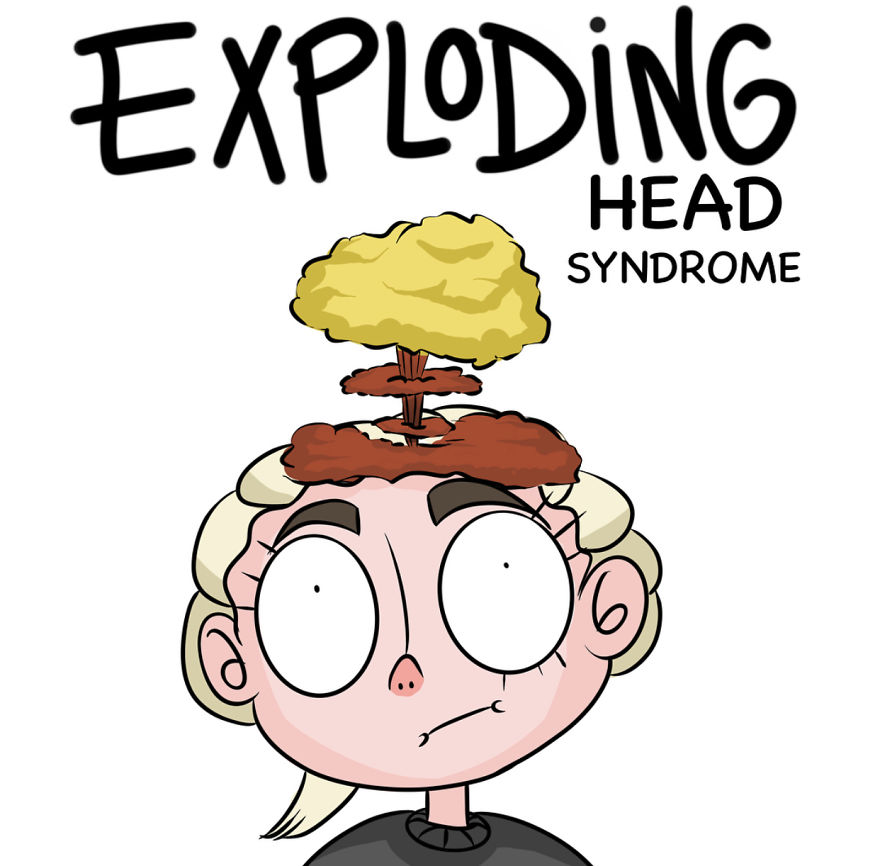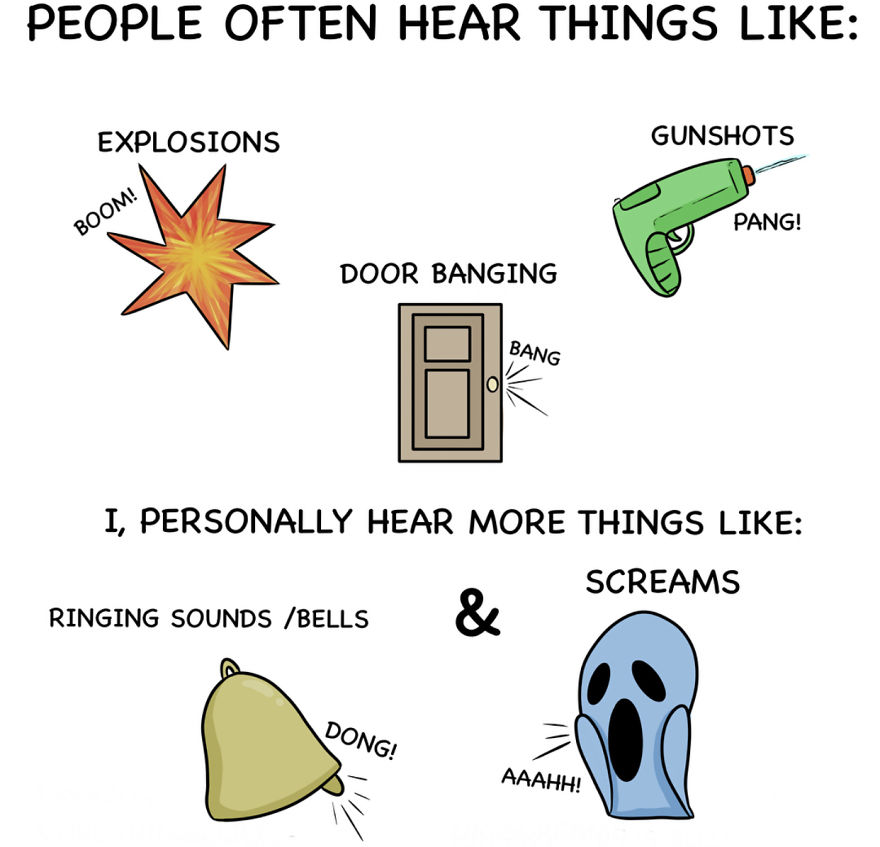Signs You Have Exploding Head Syndrome - Should You Be Scared?
Learn about the symptoms, causes, and treatment options for exploding head syndrome. Understand why this condition, exploding head syndrome, isn't as alarming as it sounds and how it can be managed effectively.
Author:Dr. Felix ChaosphereReviewer:Xander OddityFeb 09, 202410 Shares9.6K Views

Have you ever experienced having a peaceful night's rest only to be waken up by a sudden jolt? You may have explosive head syndrome(EHS).
Despite its fancy name, should you be scared? While it can indeed be alarming, Exploding Head Syndrome is generally not harmful.
Let's talk about EHS, delving into its clinical presentation, potential causes, diagnostic approaches, and management strategies. Plus, let's look into two people who had it.
What Is Exploding Head Syndrome?
Exploding Head Syndrome, colloquially known as EHS, is a type of sleep disorder characterized by the perception of a loud noise or explosive crashing sound within the head.
Contrary to its ominous name, the auditory hallucinations experienced during EHS episodes are not real and are not audible to others. These episodes typically occur during the transition between wakefulness and sleep, often startling individuals as they begin to drift off or awaken during the night.
EHS Symptoms And Clinical Features
- Auditory Hallucinations:The hallmark symptom of EHS is the sudden perception of a loud noise or explosive sound within the head, accompanied by sensations of light flashes and muscle jerks (myoclonic jerks).
- Psychological Distress:Following an EHS episode, individuals may experience feelings of fear, anxiety, or apprehension, contributing to sleep disturbances and heightened arousal.
- No Physical Pain:Despite the alarming nature of the auditory sensations, EHS episodes are typically not associated with physical pain or discomfort.
Who Can Have EHS?
While the exact prevalence of EHS remains unknown, research suggests that it may be more common in females. EHS can occur across all age groups, with some studies reporting its occurrence in approximately 16% of college students. The frequency of EHS episodes varies from person to person, with some individuals experiencing multiple episodes in a single night while others may have sporadic occurrences over an extended period.
Potential EHS Triggers
The precise triggers for EHS episodes remain poorly understood. While stress and fatigue have been implicated as potential exacerbating factors, the underlying mechanisms drivingthese phenomena remain elusive. Some individuals report an association between EHS episodes and periods of heightened stress or fatigue, suggesting a potential link between psychological factors and the occurrence of auditory hallucinations.
What Are The Causes Of EHS?
Despite decades of research, the etiology of Exploding Head Syndrome remains a subject of ongoing investigation. While no single cause has been definitively identified, several theories have been proposed to explain the phenomenon:
- Increased Brain Activity -Some researchers speculate that EHS may result from a transient increase in the activity of sensory neurons within the brain, leading to the perception of auditory hallucinations during the sleep-wake transition.
- Inner Ear Dysfunction -Dysfunction or damage to structures within the inner ear has been proposed as a potential contributing factor to EHS, although further research is needed to elucidate the precise mechanisms involved.
- Abnormal Attention Processing -Anomalies in attention processing mechanisms during the sleep-wake transition have also been implicated in the pathogenesis of EHS, highlighting the complex interplay between neurological processes and perceptual phenomena during sleep.
EHS Diagnosis And Evaluation
Diagnosing Exploding Head Syndrome relies primarily on clinical evaluation and a comprehensive assessment of the patient's medical history. The International Classification of Sleep Disorders provides diagnostic criteria for EHS, including the sudden perception of auditory hallucinations accompanied by feelings of fear or anxiety, without the presence of physical pain.
Polysomnography
Polysomnography(PSG), a diagnostic test that measures brain and body activity during sleep, may be recommended to assess for abnormalities in sleep architecture and rule out other potential causes of auditory disturbances during sleep.
Let's explore two real-life cases where PSG provided valuable insights into the nature and management of EHS.
Case 1:
Clinical Consequence
A 71-year-old womanwith left Ménière’s disease experienced leg jerks and occasional awakening from an explosive noise at sleep onset, occurring approximately once a week. Despite controlled Ménière’s disease and non-disruptive left-sided tinnitus, the explosive noise was distinct and within her brain. Before polysomnography (PSG), she had a severe attack.
PSG Result
During PSG, an explosive noise, described as a loud bang, occurred around 10:30 PM, correlating with the transition to sleep stage 1. Sleep latency was prolonged at 82.0 minutes, possibly due to restless legs syndrome. Sleep efficiency was 46.3%, with a moderate sleep apnea syndrome observed. Treatment with rotigotine improved restless legs symptoms, but oral appliance use further reduced explosive noise attacks.
Case 2:
Clinical Consequence
A 55-year-old woman with excessive daytime sleepiness and snoring, occasionally awakened by a balloon-like popping sound at 4:00 AM, referred for suspected sleep apnea syndrome. With a history of severe depression and multiple psychiatric medications, her symptoms persisted.
PSG Result
PSG confirmed an explosive noise around 3:30 AM, correlating with REM to wakefulness transition. Short sleep onset (17.5 minutes) and mild sleep apnea were noted. No seizure activity was observed. Despite psychiatric medication, symptoms continued, emphasizing the challenge of managing overlapping sleep and psychiatric disorders.
Magnetic Resonance Imaging
In addition, Magnetic Resonance Imaging (MRI)may also be utilized to evaluate structural abnormalities within the brain or inner ear. A thorough evaluation by a sleep specialist is essential for accurate diagnosis and appropriate management of EHS.
EHS Management And Treatment
The management of Exploding Head Syndrome typically involves reassurance and psychoeducation, emphasizing the benign nature of the condition and alleviating fears of underlying pathology.
While no specific pharmacological interventions have been approved for the treatment of EHS, medications such as topiramate, nifedipine, amitriptyline, or clomipramine may be prescribed to alleviate associated symptoms such as anxiety or sleep disturbances.
Additionally, addressing potential triggers such as stress, fatigue, or poor sleep hygiene may help reduce the frequency or severity of EHS episodes.
Living With Exploding Head Syndrome
Living with Exploding Head Syndrome can be challenging, particularly due to the sudden onset of auditory hallucinations and the associated psychological distress.
However, with proper education, support, and management strategies, individuals affected by EHS can learn to cope effectively with their symptoms and improve their overall quality of life.
Support groups, online forums, and advocacy organizations can provide valuable resources and a sense of community for individuals navigating the challenges of living with EHS.
“„Waking up suddenly from sleep because you’ve heard a loud noise or an explosion in your head can certainly be frightening. You’re not alone if you think this is a symptom of a serious health condition, such as a brain tumor or stroke. However, rest assured that there's nothing to worry about if you do have exploding head syndrome. Your condition isn’t harmful and should completely go away with time.- Cleveland Clinic
Exploding Head SyndromeFAQs
What Are The Common Symptoms Of Exploding Head Syndrome?
Symptoms include sudden loud noises in the head, flashes of light, and muscle jerks during sleep transitions.
Who Is Most Likely To Experience Exploding Head Syndrome?
While it can affect anyone regardless of age, it is more common in females.
What Triggers Exploding Head Syndrome Episodes?
Triggers are not fully understood but may include stress and fatigue.
Is Exploding Head Syndrome A Sign Of A Serious Health Condition?
It is typically benign and not associated with serious health risks.
Can Exploding Head Syndrome Be Treated?
Treatment focuses on reassurance, sleep hygiene, and stress reduction; medication may be prescribed in some cases.
Conclusion
Exploding Head Syndrome remains a fascinating yet perplexing entity within the realm of sleep disorders. Despite its alarming presentation, EHS is generally considered benign(not harmful) and does not pose a significant threat to one's health.
Through continued research efforts and increased awareness, we can know more about the mysteries of EHS and develop more effective strategies for diagnosis, management, and support.

Dr. Felix Chaosphere
Author
Dr. Felix Chaosphere, a renowned and eccentric psychiatrist, is a master of unraveling the complexities of the human mind. With his wild and untamed hair, he embodies the essence of a brilliant but unconventional thinker. As a sexologist, he fearlessly delves into the depths of human desire and intimacy, unearthing hidden truths and challenging societal norms.
Beyond his professional expertise, Dr. Chaosphere is also a celebrated author, renowned for his provocative and thought-provoking literary works. His written words mirror the enigmatic nature of his persona, inviting readers to explore the labyrinthine corridors of the human psyche.
With his indomitable spirit and insatiable curiosity, Dr. Chaosphere continues to push boundaries, challenging society's preconceived notions and inspiring others to embrace their own inner tumult.

Xander Oddity
Reviewer
Xander Oddity, an eccentric and intrepid news reporter, is a master of unearthing the strange and bizarre. With an insatiable curiosity for the unconventional, Xander ventures into the depths of the unknown, fearlessly pursuing stories that defy conventional explanation. Armed with a vast reservoir of knowledge and experience in the realm of conspiracies, Xander is a seasoned investigator of the extraordinary.
Throughout his illustrious career, Xander has built a reputation for delving into the shadows of secrecy and unraveling the enigmatic. With an unyielding determination and an unwavering belief in the power of the bizarre, Xander strives to shed light on the unexplained and challenge the boundaries of conventional wisdom. In his pursuit of the truth, Xander continues to inspire others to question the world around them and embrace the unexpected.
Latest Articles
Popular Articles

